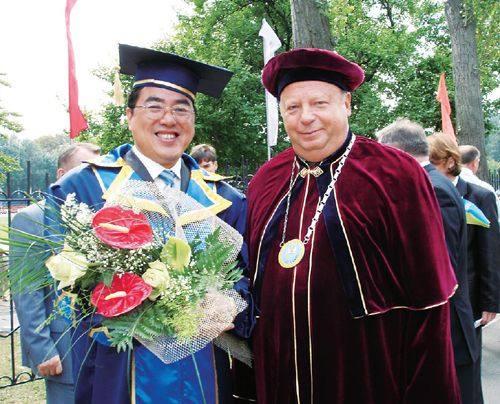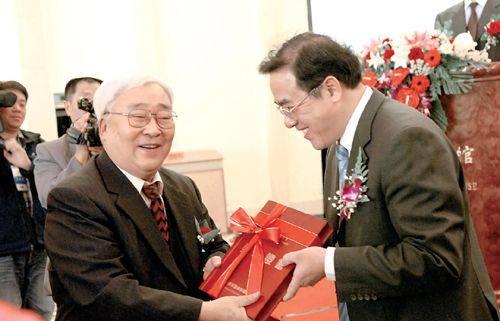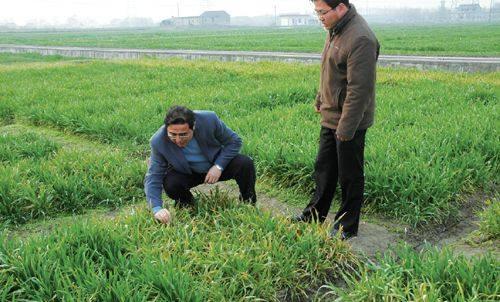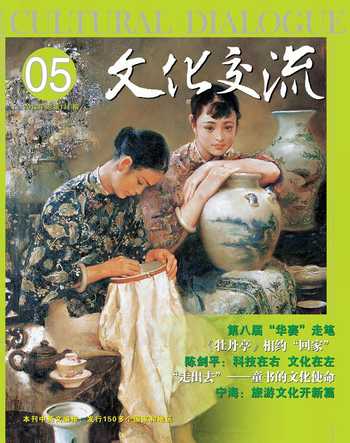科技在右 文化在左
2012-04-29冯颖平
冯颖平



2012年4月。清明节。在这个中国人的感恩节,陈剑平如同以往每年一样,携妻带女回宁波鄞州老家扫墓。虽然已经在杭州读书工作多年,但家乡在陈剑平心中的分量永远都是最重的,他不会忘记自己是从家乡的小路走出去,走向省城杭州走向首都北京直至走向世界。
在陈家老屋里,有一张沾满灰尘的椅子。整张椅子不用一个钉子,全都是用榫头紧紧咬住。这是13岁少年陈剑平的作品。
除了椅子,陈剑平记忆中还有一双鞋。那是他到十几岁穿上的第一双买来的鞋。上学前他要看到是个大晴天才穿这双鞋。其实走出家门他就把鞋脱下放入书包,赤着脚走过差不多10里路,看见校门了,再把脚擦干净穿上鞋。
这张椅子、这双鞋子可以诠释陈剑平的精神世界。正是有了赤脚走长路的意志和不用一个钉子打造椅子的细致,才会有他后来在科研道路上的艰苦跋涉和出类拔萃,并在2011年成为中国工程院院士。
百年院庆VS新科院士
走进浙江省农业科学院正门,扑面而来的那座雕塑一下子抓住了我的眼神。
雕塑的材质是不锈钢。雕塑中间造型有点像花苞,边上有点像蝌蚪又像音符。围着雕塑团团转,我怎么也看不懂这具体表现的是什么?后来有人告诉我,雕塑名为“萌芽”。中间像花苞的是胚胎,意味着一切生命的起源;而被我看成小蝌蚪的,是基因的形象表述。
我哑然失笑。之后又若有所思。
浙江不是农业大省,但浙江和农耕文明密不可分——考古学者认为河姆渡可能是中国乃至世界稻作文化的发源地;而上山文化证实1万年前当地人就会种水稻。因而,在浙江省农业科学院工作了27年的陈剑平,享受的文化熏陶肯定比在别处更给力。
目前,浙江省农业科学院科技综合实力在全国名列前茅。
而这里的领军人物陈剑平,今年不过49岁,却已当了整整10年的院长。
浙江省农业科学院的前身是创办于清末宣统三年(1911年)的浙江农事试验场,1951年更名为浙江省农业科学研究所,1960年扩建为浙江省农业科学院。2011年11月,浙江省农业科学院迎来了百年华诞,也诞生了百年历史上第一位中国工程院院士陈剑平。
2012年的一个春日,在堆满了各种学术资料的院长办公室,我接过沉甸甸的《百年珍藏——浙江省农业科学院建院100周年纪念》。这部厚重的书,由陈剑平作序:“以时为经,以事为纬,述而不论,力求图文并茂、可读可品。然,‘吟安一个字,拈断数茎须……当然,管窥之见,疏漏一定不少;辞不达意,还望仁者谅解。只是,人生有代谢,事业需传承。”
品读这些文字,可以看出陈剑平对这所百年老院文化积淀的那份自豪,以及对中国传统文化的那份痴迷。
序言之后是院徽、院训、院歌和百年赋。纪念册的首页印着当年毛主席在浙江省农业科学研究所扶着双轮双铧犁耕地的版画。
我从这本纪念册中,读到了省农科院的百年文化。
因为陈剑平力主搞科研要有英雄主义、浪漫主义、理想主义精神。他一向认为人的素质最重要的是先进的文化和理念,文化决定未来,理念决定发展。文化是农科院赖以生存和发展的血脉,编写百年纪念册,通过科研人员的回忆与反思展示农科院的光荣历史和深层文化底蕴,传承农科院的优良传统和作风,才能构建一代胜过一代、奋发向上的精神。
1985年陈剑平从浙江农业大学毕业,走进浙江省农业科学院工作直到今天,虽然中间曾三次出国又回国,但无论人在何处,陈剑平都忘不了毛主席手扶双轮双铧犁行进在田头的那个定格,由此知道农业科研的方向就是为“三农”服务。
早在1990年,27岁的陈剑平在英国洛桑实验站进修时,奇迹般地在禾谷多黏菌介体内发现了病毒粒子,首次揭示禾谷多黏菌与其传播病毒的内在关系,一举攻克了西方科学家30年没能攻克的科学难题,被誉为真菌传植物病毒学发展史上的一个里程碑;1998年底陈剑平发现并命名的“中国小麦花叶病毒”是由中国科学家发现并被国际病毒分类委员会确认的第一种植物病毒;2004年陈剑平领衔完成了“我国水稻黑条矮缩病和玉米粗缩病病原、发生规律及其持续控制技术”,这项成果创造了两个世界第一:第一次揭示了两种病害的发病原因、发病规律;第一次完成了水稻黑条病毒基因组的全序列测定,并被美国国家生物技术信息中心确定为该病毒的标准序列。
这些年来,陈剑平一次次把“中国”刻在了世界植物病毒学发展里程碑上,先后获1992年全国十大科技成就1项,国家科学技术进步奖一、二等奖4项,省科技进步奖一等奖6项,以及中国青年科学家奖、全国劳模、五一奖章、第五届光华工程科技奖青年奖、何梁何利基金“科学与技术创新奖”等多项荣誉。
一国之士VS一院之长
我和陈剑平有过数次长谈。最近的一次交流让我看到了一个胸襟开阔的中国工程院院士和恪尽职守的浙江省农业科学院院长。
陈剑平说目前自己的第一身份是浙江省农业科学院院长,第二身份是院士。“可以这么说,当院士是把自己的科研工作搞得更好;当院长是让大家的科研工作搞得更好。前者是个人追求,后者是个人职责。我既然接受了这个岗位,首先应当恪尽职守。”
在陈剑平看来,科学人生必须有一个崇高的理想和远大的目标。在实现人生目标的进程中,有时候需要一点狂劲。1990年8月,陈剑平以旁听者身份第一次参加在德国举行的国际真菌传植物病毒大会。遥望主席台,擔任大会执行主席的一位东方人引起陈剑平的注意。他打听到这位日本国立农业研究中心的年轻博士刚过而立之年,却已是这一研究领域的权威人士之一。当时的陈剑平既羡慕又更希望有朝一日也能坐上执行主席的位置。
三年之后的1993年,在法国巴黎召开的第七届全欧植物病理学大会上,陈剑平实现了这个愿望。至今陈剑平已无数次在国际学术会议上作学术报告,其中5次为会议执行主席之一。
陈剑平知道,既然当了省农科院院长,那么仅仅有个人的科研成果是不够的。于是他在全国农科院率先提出学科与标准化研究所建设,在不断调整完善学科结构过程中,又千方百计地寻找各个学科的带头人。
他给我看的资料中,有一张PPT上面只有I、T、G三个字母用箭头连接,表示从I到T再到G。陈剑平坦言:“自任院长以来,我个人在显微镜下的科研时间肯定要耽误不少,但让我高兴的是,我可以为更多的科研人员提供一个走向成功的平台。”据陈剑平解释,“I”就是英文“我”,是对自我价值的实现,个人出色完成科研工作;作为一院之长需要在“I”粗粗的一竖上面加上重重的一横成为“T”,这是英文“团队”(Team)的第一个字母,也就是聚集和使用更多的人才,至今他已经培养了17名博士、40名硕士,其中多人破格晋升为研究员;而“G”是战略目标的英文(Goal)的第一个字母,他的目标是带领团队为支撑和引领中国的现代农业发展作出贡献。
在农科院,一度流传过陈剑平万里飞鸿请来海归博士陶跃之的故事。我见到这位陶博士时问:“你为什么肯来浙江农科院?”因为陶博士在英国剑桥大学获得博士学位后,夫妻俩在澳大利亚已经十几年。后来夫人到浙江转化科研成果,他就被引进到浙江大学。
由于陶博士的专业是分子育种,有人建议他到浙江省农科院看看。没想到他和陈剑平一见面就谈得志同道合。陈剑平直截了当邀请陶博士加盟浙江农科院。但陶博士婉言谢绝。因为他是到浙大办手续的,人到中年的他更喜欢在大学教书。
三天后,陶博士回了澳大利亚,没想到陈剑平的信紧跟而至。信中陈剑平言词恳切,说和浙大相比,农科院是个小单位,更需要像你这样的学科带头人。——总之,请您无论如何来我院工作。我给您出了个难题,请原谅,请保持联系。
信不长,一张农科院的信笺纸;话不多,就是实实在在的几句。
陶博士却被陈剑平的真诚感动,义无反顾地直奔浙江省农科院而来。而这封万里飞鸿,也被陶博士珍藏了许多年。
陈剑平说,请陶博士加盟时,院里“海归”博士还屈指可数,而现在,这支队伍已经扩大到几十位,数字农业研究所、食品科学研究所的所长都是“海归”一族。
农科院人提及这位笑容可掬的院长,使用频率最高的两个词是:真诚、亲切。不仅仅是对科研人员真诚,而且和所有人交流都没有架子。
如果不外出,陈剑平每天下班后都会到院体育活动中心打羽毛球,打球输赢不重要,惬意的是球场上院长和普通员工一样,都痛痛快快地奔跑流汗。
陈剑平常说自己的人生是“科学人生”,而不是“仕途人生”。对此他的做法是把院长这顶正厅级的官帽不戴在头上,也不放在桌上,而是拿在手上。他笑着向我解释:戴在头上会真的把自己当成一个官而忘乎所以,放在桌上却又太不当回事,而拿在手上的意思是没有当官的瘾,却必须做好该做的事,必须负责任。
当院长十年,陈剑平的工作思路很实在,凡事都问一问该不该做?值不值得做?
在科学人生的道路上,陈剑平有一个目标是成为院士。
2011年11月的某天,我收到陈剑平从北京发来的短信:“我终于当上院士了,感谢这些年来对我的鼓励和支持。”他认为评上院士是对自己这么多年科研工作的认可,是一个更高层次的开端,意味着更多的责任和担当。
陈剑平院士说:“粮食问题始终是关系国计民生的大問题,也是我心里的头等大事。”
有一个数字陈剑平向我多次提及,那就是中国一年的粮食安全需要有1万亿斤,每年因病虫害而少收1千亿斤!陈剑平主持的多项世界级研究成果就是治疗大麦、小麦、水稻、玉米等粮食作物所患病毒病,以世界前沿科技来保证中国的粮食安全。其实陈剑平的科研就是“虫口夺粮”。
陈剑平清楚地认识到,搞农业科研,科研成果不仅仅是发表在科学杂志上,更应该写在广袤的大地上。尽管陈剑平现在公务繁忙,但还是千方百计抽出时间到田间地头去。
近几年来我国的极端天气日益增多,尤其是今春不是雨雪成灾就是连续干旱,极大地影响到粮食生产。仅在三四月份,陈剑平就像个“空中飞人”,奔波于全国各地,到大小麦病区调查病害发生情况,并与农民和植保技术人员进行现场交流,还要见缝插针给他们开讲座。我看到,他的手机里有着密密麻麻的一条又一条航班登机信息,陈剑平把自己的科研成果实实在在用到了指导全中国的农业生产上。
终极追求VS闲情逸致
陈剑平愿意用一生时间做好一件事,就是在植物病毒学领域里不断探索,取得更大的成就。
陈剑平曾经就读的鄞州中学和五乡中学请他给学弟学妹做个励志报告。去的那天恰逢植树节。“十年树木百年树人”,他舍得从百忙中抽出时间,也就是想用自己的经历影响更多的年轻人报效国家奉献人类。他用一件件亲历告诉这些青年学生:“科研工作是我的终身职业。”
一幅大尺度照片定格了陈剑平1995年12月获英国丹迪大学植物病毒学博士学位时的瞬间。英气逼人的陈剑平穿着博士服,头上却没有如常人那样戴着博士帽。陈剑平告诉我其中的秘密:“戴上博士帽就是止步于博士,我的追求不仅是博士。”
我笑言:“幸亏中国工程院院士没有专属服饰,要不然你现在也不会戴上院士帽。”
我很清楚,博士、院士都不是陈剑平的最终目标,永不懈怠的科研探索,才是他的终极追求。
科研是陈剑平的职业更是事业。在工作之外,陈剑平可不是成天想着数据走路都会撞上树干的老夫子。
到过西方三十几个国家的陈剑平,出国时只要挤得出时间,就会去欣赏、购买油画。陈家的客厅挂着摆着大大小小十几幅油画。正中墙上最大的那幅宽约1.5米高也超过1米,画面是一派安逸的田园风光,尖顶房,参天树,蓝天白云,小河小船。小孩骑着马,女人在洗衣,远景还有垂钓者……那是陈剑平花了4000多欧元不远万里从荷兰买回来的。
陈剑平叫我走进储藏室看看,里面还有一幅又一幅紧裹着包装的油画,他说有不少从国外买回来还没打开挂出来过。
不要以为陈剑平是为了投资才买油画。他说自己只是看着养眼,喜欢这些画面上的山水田野,宁静淡定。而阡陌纵横蜿蜒小河这些景象,是他熟悉的“三农”风光,而油画的写实技法让他看到水是水、树是树,直白如同照片,更像科学一样率真。
陈剑平的妻子是著名越剧演员,她主演的《九斤姑娘》,陈剑平不仅对剧情烂熟于心,连唱词都记得一清二楚,有时台上演员唱错一句他都可以听出来。
经常看越剧的陈剑平不会唱越剧。但有次妻子在外拍电视剧《杨乃武平冤记》,陈剑平去探班,一时兴起,友情客串穿上戏服扮了个官老爷,虽然只有一句台词,扮相和气质都很入戏,赢得一片喝彩声。和他同台出演杨乃武的,就是现如今大红大紫的余少群。
陈剑平工作再忙,也会挤出时间和妻子女儿去看电影。问他最近看了什么片子?回答陪妻子去看了《金陵十三钗》,和女儿去看了讲企鹅一家的《快乐的大脚》。
清明节假期的第一天,我如约在9点半按响陈剑平家的门铃,一次又一次却没人应。无奈我只能打电话,铃响很多次,才听到一个睡意矇眬的声音接起电话。原来头天晚上夫妻俩在看谍战连续剧,开始说看到12点就休息,可是看得入迷欲罢不能,居然一直看到凌晨4点钟。
这样的放松对陈剑平是一种难得的奢侈。大部分日子他比普通人要付出更多的努力,工作时常忘记饭点,没有周末,总是成为“空中飞人”,工作安排爬满周历本上的每个空格。只要在杭州,坚持每周三晚上和实验室成员交流工作。他经常乘半夜三更的红眼航班回家,到家后必定打开电子邮箱,如果有他带的博士、硕士的科研文章,他就立即看过提出意见反馈回去,从不过夜。有时半夜想到什么科研新思路,也会打电话给实验室助手。
那天,陈剑平抱来一大摞书给我看,都是有关人生哲学的,其中被誉为中国最顶尖的文化大师季羡林的有三本:《读书与做人》《我的人生感悟》和《讲真话》,还有于丹的著作等等。这些书都是陈剑平在机场候机楼或者所住宾馆的小书店买的,基本上在买的时间段一口气看完,之后要引用可以信手拈来,潜在的文化浸淫自然不言而喻。
虽然陈剑平自己喜欢油画,但是他送给中国工程院郭予元院士八十寿辰的礼物却是一个国画立轴。他打开画作,告诉我画上题写的苏东坡那句“一蓑烟雨任平生”是他特意选的,取的就是那份风轻云淡。正如陈剑平所言:“这是郭先生一生写照,也是我自己的人生感悟。”
科技在右,是因为对陈剑平而言,没有什么比科技更重要;
而文化在左,因为陈剑平是个有文化的科学家。□
Chen Jianping: Man of Science and Culture
By Feng Yingping
49-year-old scientist Chen Jianping was elected academician of China Academy of Engineering in November 2011. He is one of the only two academicians Zhejiang had in 2011. The success story of the agricultur-al scientist was seemingly foretold by two anecdotes in his boyhood years in Yinzhou, a key district of Ningbo, which is a port city of Zhejiang Province. At 13, Chen Jianping built a wooden chair by himself. The chair does not have a nail. The self-taught car-penter made all the tenons and sockets so that he was able to put all the parts together without using a single nail. The chair is still in the ancestral house of the Chen family. He did not have a pair of shoes bought until he was in his early teen years. He wore the shoes only when it was a fine day and when the road was not sticky. He would walk barefoot for about 5 kilometers and it was not until he saw the gate of the school that he cleaned his feet and put on the precious shoes.
The boyhood anecdotes relate how he translates his dream into reality and how he persists. With this knowledge of his past, no one would find it difficult to understand how the scientist has traveled barefoot all the way through his journey of science.
He assumed presidency of the Zhejiang Academy of Agricul-tural Sciences (ZAAS) ten years ago. Zhejiang is by no means a powerhouse of agriculture. However, archaeological discoveries at Hemudu, a prehistory site near Ningbo, indicate that our ancestors at Hemudu grew Chinas and probably the worlds first rice crop; archaeological discoveries at the Shangshan site indicate that local residents grew rice about 10,000 years ago. With such deep roots in history, Zhejiang plays a leading part in Chinas agricultural studies.
Upon graduating from Zhejiang Agricultural University in 1985, Chen Jianping started working at Zhejiang Academy of Agricultural Sciences. During the 27 years, he studied abroad three times. In 1990, 27-year-old Chen did a research project in Britain and accom-plished a breakthrough by detecting the barley mild mosaic virus within the bodies of fungus spores. His professor and other eminent researchers had tried in vain to find the virus. This discovery is widely considered a milestone in plant virology. In 1998 and 2004, Chen made two other breakthrough discoveries in plant virology and he is widely recognized in the world for his central contribu-tion. For his outstanding research results, Chen has been honored with prestigious awards and medals at national and provincial level.
The other day, I had a long conversation with Chen. The conver-sation enabled me to understand why he is such a brilliant scientist and a highly competent president of the ZAAS. Chen Jianping says his first commitment is to the presidency of the academy and the academician status is secondary. “Being an academician helps me do a better job of my research work. Being president of the ZAAS helps all the colleagues do a better research job. The former is my individual pursuit and the latter is my obligation. Since I have as-sumed this presidency, it is my obligation to do my best.”
As his individual research results are not enough for the ZAAS, he knows he needs to build the academy up. He was the first in the countrys institutes of agricultural sciences to formulate a charter and build up a system for development and operations. Chen has spared no efforts to find talents to head research projects at the ZAAS. He emphasizes team spirit and understands the importance of building up a team of talents. Since he became the president of ZAAS, he has nurtured 17 doctoral students and 40 masters.
Dr. Tao Yuezhi is one of the first talents Chen Jianping success-fully engaged to work for the ZAAS. After attaining PhD degrees from Cambridge, Dr. Tao and his wife worked in Australia for more than ten years. His wife came to Zhejiang to commercialize her re-search results and Dr. Tao received an offer from Zhejiang Univer-sity. As he specializes in molecular breeding, he was recommended to visit the ZAAS. Chen Jianping and Tao hit off immediately and Chen invited Tao to join the team. Tao hesitated because he had meant to teach at Zhejiang University. Tao spent a brief period in Hangzhou before he went back to Australia. To his surprise, he received a letter from Chen Jianping shortly after he was back in Australia. The brief letter was sincerity itself, inviting Tao to work at the ZAAS. Tao was touched and joined the ZAAS. At that time, he was one of the few talents working for ZAAS. Now the ZAAS boasts dozens of researchers who are back from overseas.
Chen comments on his life and career succinctly this way: sci-ence is his career and administration is not. According to Chinas academic system, the presidency of the ZAAS is equivalent to the directorship of government department at provincial level. That aspect of his status is not what he cares. He cares his responsibility for agricultural sciences. As president of the ZAAS, his top prior-ity is the countrys food security. China needs 5,000 billion kilos of cereal a year to feed the people whereas viruses and insects destroy 500 billion kilos of cereal output a year. The research projects he heads at the ZAAS are meant to fight viruses in barley, wheat, rice and corn so as to boost food output as much as possible.
Every March and April, Chen travels busily all over the country to visit barley and wheat production areas. He watches crops and holds lectures and chats with first-line crop protection technicians and farmers.
Chen commits himself to science research. He is by no means a scholar who, totally absorbed in his thinking, bumps into trees or land poles. He is a man of culture. He has visited more than 30 countries in the world. During his visits, he managed to find time to visit galleries and buy oil paintings. The sitting room at his home is decorated with more than 10 oil paintings of various sizes. The largest one, a centerpiece in the central wall, is an oil painting that is 1.5 meter wide and 1 meter tall. He bought the landscape for 4 thousand Euros. The storeroom holds more paintings still in wraps, some of which he has not found time to unpack. These artworks are not investments. He buys oil paintings for appreciation only. These landscapes calm him down. He likes realistic touches of these paint-ings because they remind him of rural scenes.
His wife is a Yueju Opera artist. Chen is familiar with her plays so much that he can recite arias line by line in a play she stars. One day while visiting with his wife on a shooting location with a crew for a television version of a Yueju Opera play, he was given an offer so irresistible that he put on costumes and acted as a government official of old time, an role that spoke only one line. His perform-ance was highly appreciated. He is a family man. He once watched a series of spy drama all the night with his wife until four oclock in the morning. He goes to movies with his wife and their daughter frequently.
He buys books at airports and hotels and read them up. Many of the books he reads traveling around are about philosophy, life, about how to be a better person, how to use time more efficiently.
The cultured president of the ZAAS has long since decided that culture is the decisive factor of the future of the ZAAS. In order to boost the ZAAS culture, he presided over the task of publishing a memorial brochure in commemoration of the 100th anniversary of the founding of the ZAAS. Chen believes that the brochure helps carry on the commitment and dedication of the scientists of the ZAAS of the last 100 years over to the future. □
